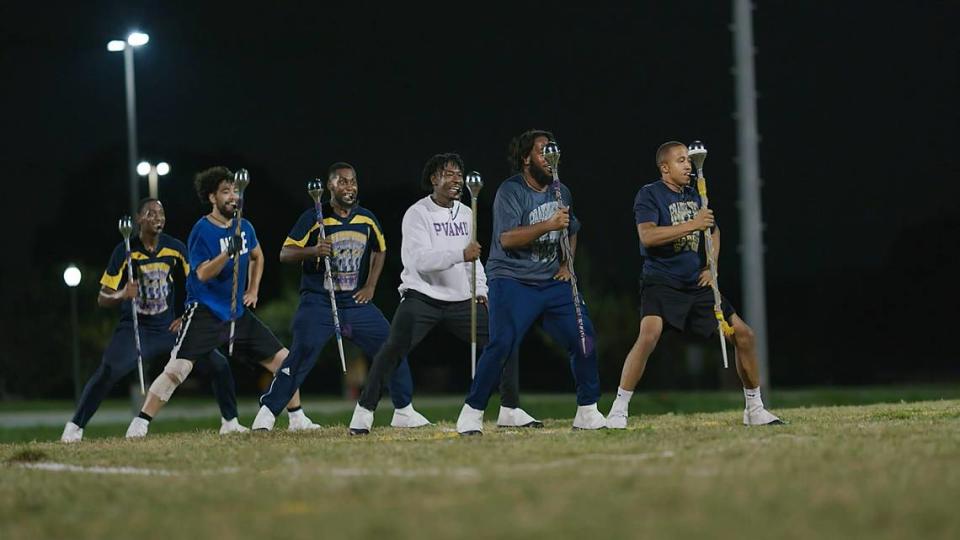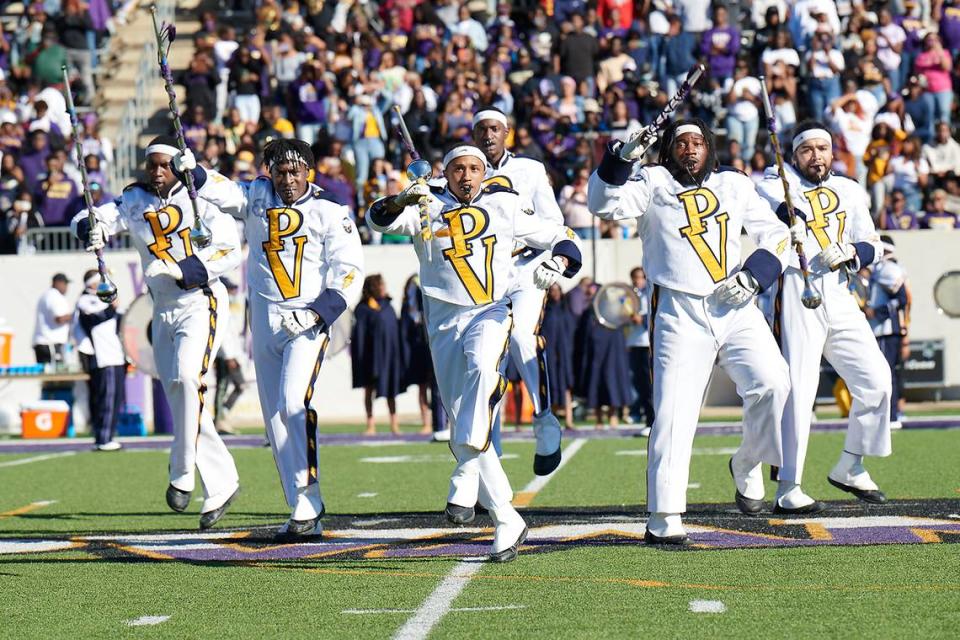Garinger High grad took his marching band talents and got out of NC. Now, he’s on TV.
It’s been nearly eight years since Aaron Best graduated from Garinger High School and moved west from Charlotte to enroll at Prairie View A&M University, where he is currently a senior and a leader of the school’s marching band.
While multiple breaks from his studies have made it so that Best will be 26 years old this spring — when he expects to finally earn his degree in music education — those breaks also put him in a position to be something he wouldn’t otherwise have been if he’d made it through college on schedule:
A TV star.
Best is among a handful of featured cast members on “March,” a series of eight hour-long episodes that premieres at 8 p.m. Monday on The CW network, and revolves around the 300-member marching band at the historically Black university Prairie View A&M.
Shot last fall, it’s in the vein of Netflix’s runaway hit docu-series “Cheer,” and it’s getting good buzz; Variety recently called it “a lovely, unexpected watch.”
“I think I just heard about it last year, honestly,” Best says of producers’ plans to send cameras and production crews to Prairie View, which is less than 50 miles northeast of Houston, Texas. “My reaction? I was like, ‘That’s cool. That’s a cool idea. I don’t know if they wanna do this band. This band, we be having some drama sometime.’ ”
The overarching drama is whether The Marching Storm will rise to the top of the national HBCU band rankings, though there are personal dramas, too. In Best’s case, he’s a team leader in his last season, so there’s the question of who’ll be ready to fill his shoes.
Here are seven things we learned from Best about him — and about “March” — in a recent phone conversation.

From Charlotte to Prairie View
He didn’t learn about Prairie View A&M until late in his high school career. “I had other schools that I definitely had in mind. ... Being from North Carolina, we don’t really know anything about Prairie View,” Best says. “I was gonna go to (North Carolina) A&T (an HBCU in Greensboro). That was my dream school. I was going there to actually major in dance.”
But during his senior year at Garinger, where the “band kinda helped me out of a situation in my life that could have went very wrong, and my band director told us straight-up: ‘Y’all need to take y’all talents and get out of North Carolina. Go see the world. Go see other states. Go see other countries. Whatever you wanna do. But you do not have to stay here.’ And we listened.
“So we all applied to different out-of-state schools, and... I had a friend that already was at Prairie View. Khalil Deanda. He is also from Charlotte. A graduate of Garinger High School. He came to Prairie View the year before me. He was a very close friend. So he was always telling me things about Prairie View, little intriguing things.
“And one day I was just thinking. Like, ‘Man, I really wonder. ’Cause I’ve never really been to Texas. I wonder how it would be out there?’ So I got in contact with (Prairie View director of bands) Dr. (Timmey) Zachary, and one thing led to the next. I was here in Texas by July.”
First look at The Marching Storm
The first time he witnessed The Marching Storm, he was a part of it. “I hopped on a plane, two hours later I was here, Dr. Zachary had his wife — Miss Shawn Zachary — come and pick me up from the airport. They brought me to campus. They made sure I got everything, got settled in, and then we started band rehearsal.
“And my first time ... they really let us play, I can say: The way that felt was like no other. Like, coming from a band of 30 people, (at Garinger) we thought we was loud. Because the other bands in Charlotte ain’t much bigger than us. So we thought we was loud, we thought we was cool, we thought ?we was good.
“But hearing — well, at the time, 2014, we had about 150 people in the band here at Prairie View. And just hearing that amount, which is literally less than half of what we’ve grown to now, was life-changing. It literally was a different feeling I’ve never felt before.
“Being a musician, being somebody who is enthusiastic about music, I can say listening to a marching band of that caliber, with that type of power, that type of sound, it can definitely change your outlook on a lot of things when it comes to this marching band. ...
“A lot of people just (hear) ‘marching band,’ they be like, ‘Oh, it’s just band.’ But no, you can feel the passion in the room. You can feel the aggression, the power. It’s literally like no other.
“You have to feel it and hear it to really understand what it feels like.

What’s a drum major?
As a senior, he’s a drum major. What’s a drum major? “The drum major is basically the leader of the band,” he says. “That’s the person that is normally in the very front of the band, marching in front of them or doing the dancing or the really spectacular stuff ... to really get the crowd going. We’re really just the frontmen, the entertainers. For HBCU, especially.
“When you’re talking in terms of PWI (predominately white institutions), they (drum majors) are more so the directors. They’ll be on the podiums, conducting and making sure everybody is keeping time, making sure the band is together. So I guess you could just say the drum major’s really just the main glue that holds the band together and makes sure that everything is going smoothly.”
Making his way onto ‘March’
He thinks the producers wanted to focus on him because of the insight he could provide. “In the earlier stages, when they were trying to see who was interested, I signed up and I told them I was interested (in being featured),” Best says. “I was very apprehensive. Not gonna lie. It’s television. You never know.
“As outside people, we hear things about how television works, but you don’t actually know until you’re doing something with it. But once they picked me, I definitely feel like it was because of my knowledge of the band. ... I’ve been here since 2014. There’s only one other person that still marches in the band currently that’s as old as me.
“So yeah, I feel like they picked me mostly because of that. The experience. They felt like I’d have some stuff that I could tell ’em. And I definitely had some stuff to tell ’em.”
Ready for his close-up — sort of
Filming was more awkward than he anticipated. “Honestly, for me, I’m not really big on having a whole bunch of attention. So my method of what I had to end up doing, I literally ignored them,” Best says of the cameras. “I acted like none of those people existed for about a good two weeks. Maybe three. ...
“I couldn’t even look at these people. ’Cause if I looked at ‘em, it was gonna make me feel some type of way, ’cause it’s like, ‘Damn, they really recording me.’ But after awhile, you get used to it. Once I really met the crew, they’re all cool people. ... I honestly wish I would have been a little bit more open earlier to them. But overall, it was cool. It wasn’t that bad by the end.”
Giving exposure to HBCU life
Best is excited about the prospect of “March” opening the eyes of people of all colors and backgrounds to HBCU culture and Black experiences. “It’ll kinda influence more young Black youths, even non-Black, Hispanic, other minorities — anybody, honestly, to just be a little bit more active in trying to understand who you are, because frankly the show is still us growing up,” he says.
“The show is still us going through our daily lives learning normal lessons. It’s still us being us. And it’s not scripted ... it’s actual things happening in the show. Real-life, real-time. I feel like that’ll help connect more with the audience.
“Overall, I really want — as far as the Black youth go — for them to be influenced to choose HBCUs more. Because we are the ones that can grow our culture the fastest. We have to buy into ourselves, first. So I feel like this show will help a lot of those things get through to a lot of different audiences. ...
“Even with our caucasian audience. I feel like they’re still gonna enjoy this show, and they’re gonna learn something new, even to the point where they might be intrigued to join a HBCU college or even go be in a HBCU band now, because we are being very inclusive right now. This show highlights us having our first-ever Hispanic drum major here.
“So we are pushing the inclusiveness as far as we can go right now.”

‘If it wasn’t for band...’
7. Best says that he now sees being in the marching band at Garinger as having saved him. “In Charlotte, after school ... if you’re not in an extracurricular activity, you just go do whatever. You just run the streets.
“And what marching band did was after the hour of 2, I had something else that I had to do. I had more assignments. I had to go work on my instrument practice before band practice, then go to actual band practice at 2:30 or 3 o’clock, whenever he would have it, and it just gave us something else to do to keep us busy and keep us growing as people.
“I feel like in a lot of HBCU culture especially, there’s a lot of people that can attest to band — music in general — saving their lives, because a lot of us are coming from underpaid homes and impoverishment. ...
“If it wasn’t for band paying for our school — ’cause literally, I haven’t — thanks to Dr. Zachary and The Marching Storm, I have not really had to pay a penny to attend Prairie View A&M. ... My family wouldn’t have been able to afford that. And he knows that.
“The type of care that these directors at these HBCUs give to their students, and the attention — knowing the situations that we all come from — is unmatched, honestly. We really appreciate our band directors for having our backs like that, because at a lot of institutions, they don’t care about your personal life or where you come from, or what happened back home.
“So that’s kind of a thing that we have in our culture.”
“March” debuts from 8-9 p.m. Monday, and will air in that time slot until Feb. 27, when it moves to 9-10 p.m. Sundays.

